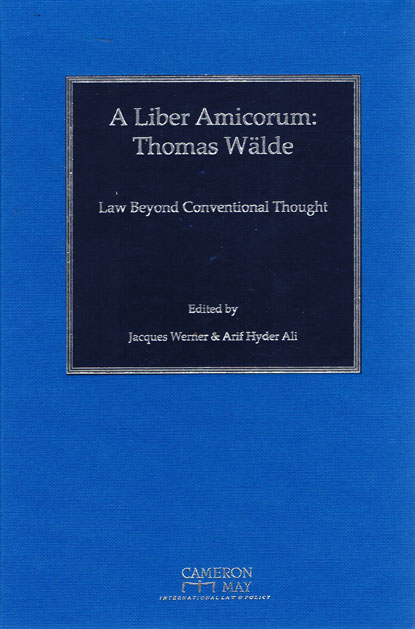
This book was published in honour of Thomas Walde, who tragically passed away in October 2008. The editors Jacques Werner and Arif Hyder Ali gathered an impressive collection of essays by practioners, arbitrators and professors who knew Thomas Walde in a modest effort to capture Thomas' never ending interests.
In 1980, he joined the UN and later became UN Interregional Adviser on international investment policy and petroleum/mineral legislation. He advised numerous governments on legislative reform and contract negotiations with international investors.
He was also, from 1981 to 1983, UN investigator on occupation practices in Palestinian territories and was responsible for the Secretary General's reports on 'Permanent Sovereignty over Natural Resources' and on the Permanent Sovereignty in Occupied Palestinian Territories. He initiated the UN project for environmental guidelines in mining and was chair of the drafting group that produced the first version of the 'Berlin Guidelines' in 1990.
In 1991, he joined the University of Dundee as Director of the Centre for Energy, Petroleum and Mineral Law and Policy (CEPMLP). He was later awarded by the European Commission a Jean-Monnet chair in European Economic and Energy Law. After stepping down from the post of Director in 2001, he maintained his role as a teacher and expanded his activities in the field of dispute resolution and arbitration, where he quickly enhanced his already formidable reputation.
Whilst at the University of Dundee, Thomas came up with the idea to extend his global network to develop an extraordinary virtual campus of leading practitioners and scholars around the world, who became part of the Dundee intellectual family. In recent years, OGEL & TDM became an important instrument in these networks.
There are so many of Thomas' accomplishments that could easily inform these lines, although perhaps the one that became so important to so many of us is the OGEMID on-line forum - a forum that reflected Thomas' understanding of technology and its role in intellectual development, that reflected his ability to move issues and agendas, and that connected legal and non-legal professionals from around the world in a democracy of legal dialogue, debate and thought.